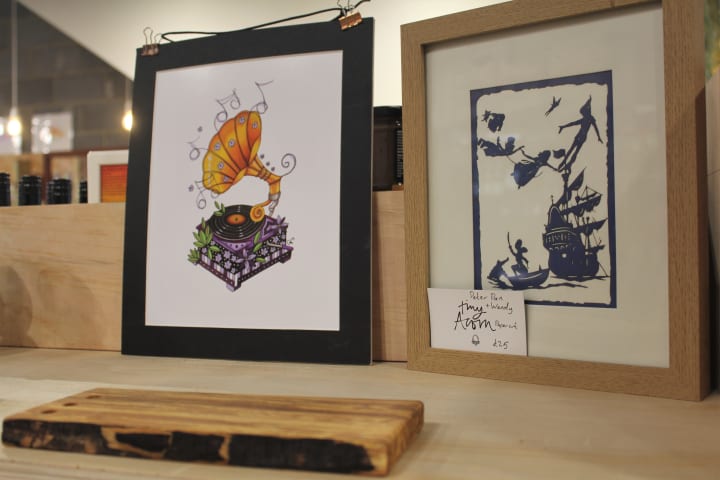Reinventing the High Street
Can community-oriented shopping reinvigorate town centres?

There are bright spots on the High Street – if you know where to look for them. While the old certainties are disappearing, local producers are taking the chance to boost their presence. And Discovering Durham, in the Prince Bishops Centre, is at the heart of that process.
The store, which recently moved into larger premises, initially opened last year as a pop-up supported by the local authority. When it was time to pop down again, some of the producers who showcased their work decided to keep the idea alive as a Community Interest Company (CIC).
Today, there’s a longer-term plan to support a vast range of local suppliers and helping businesses develop faster. And there are hopes that it could be the catalyst for a local regeneration of Durham, with Prince Bishops ready to welcome more ‘homegrown’ stores in the near future.

Liza Johnson is one of the drivers behind the project, dividing her time between the shop and running the Tea Enthusiasts, one of the 40+ suppliers available in store.
“This is a fantastic way of boosting the local economy,” she said. “All these businesses are local, everything in the shop is sourced within 20 miles of where we are now. Even where companies source their goods from overseas – like the teas, coffees or chocolate – they are still providing local jobs.
“The tea merchants employ five people. If you multiply that by 40 businesses in here, it soon adds up.”

Signs of recovery
And, despite a uniquely challenging year, there is good news.
“Durham is recovering,” Liza insists. “Look at turnover. July wasn’t our worst month of trading, despite the restrictions. January was worse than July. That’s a positive. Things are building and growing. This year, we’re seeing a lot of domestic tourism, people with connections to Durham – ex-university, friends or family in the region – are visiting because people aren’t going abroad.
“And when people come out, they are spending money. We don’t see so many browsers, but when people are here, they are buying. And there’s already a definite trend about Christmas shopping. Nobody knows what Christmas might look like this year, so when they see something that might make a good gift, they are buying it. That’s a real change from last year.”
The shop has changed to, with a food-first approach rather than crafts and tourist stuff. “It’s not such a problem now more places are open, but when all the cafés were closed there was a definite issue with people wanting to get something for lunch. Now we’re selling pies and pasties because people working in the city want something convenient, something different, to have for lunch.”

Your community needs you
Another attraction of lunch at Discovering Durham is that it supports the immediate region. As a CIC, profits remain in the community. There’s no shareholder dividend to pay, no tax efficient offshore HQ. Instead, the money is invested in tailored training to help businesses improve their offer, or to improve the shop. New suppliers are often partnered with more established traders, accelerating along the learning curve that all new operations face.
“Right now, it’s training about labelling, before that we looked at how to sell on Amazon,” Liza added. “Whenever we have those training sessions I try to open it up to others who can benefit, like the guys at Durham Indoor Market. It’s not just supporting our businesses but supporting the whole city.
“We can offer specific training, tailored to our producers in a way that a lot of business support isn’t. We have producers who never tried to make something to sell before. They have the skills to create their product and we can provide a lot more mentorship, support and development. The guy behind Jonny Biltong, he’s got a fabulous product, but it was the first time he’d brought something to market. He’s a very intelligent guy but there are things that take years to learn.
“We were able to buddy him up with another producer, who had 10-15 years’ experience of selling at markets. That kind of mentorship helped him to make a six-month jump in his learning in the space of just a month. You can’t underestimate things like that.”
Dog treats, a regular request from shoppers out walking their dogs at the weekend, also benefited from practical help.
“The treats were fantastic, but the packaging wasn’t up to our standards,” Liza said. “Legally it was fine, but the reputation of every trader in our store depends on everyone else. So we buddied them up with the Canny Candy Gadgies, who use similar packaging. We offered a small loan so they could buy a sealing machine and, over a few months, we took a small piece of their commission to get that loan back.
“She was able to charge more for the dog treats because they were properly packaged and labelled, she’s earning more, the store generates more, and our customers are happier.”
The process also nurtures new relationships between companies. McColl’s Brewery, in Evenwood, started brewing a distinctive ‘spelt’ beer using grains from another County Durham company, Craggs & Co. When Liza’s fellow director Matty Booth saw the beer in store, it prompted him to bring the grain experts into the Discovering Durham family. Matty’s also proud of the connections between different producers involved with the shop: Ivy’s Bakery made its latest batch of speciality scones using flour from Craggs, fruit preserve from Screaming Chimp, milk from Embleton Hall and Weardale cheese. Once again, businesses support each other.

An experience for everyone
One of Durham’s challenges is a diverse customer base. With 19,000 students and 9,000 residents in the city centre, Discovering Durham aims to appeal to both groups – plus tourists looking for souvenirs of their trip to a World Heritage site.
“We’re creating a space that customers love,” Liza said. “You can’t see it at the moment because of the COVID restrictions, but this is an experience store.
“Normally, as you go around, there are tasting stations where you can try the food, smell different products. Next to the counter we should have a ‘meet the producer’ space where people bring in their samples and explain what they do. They share that passion for their thing directly with their customers. When we can do that, it draws even more people to the shop, but it’s difficult to do it safely right now.
“And we’re not just a tourist trap. We get people coming in to pick up their bread and butter – literally. And locals also come for more interesting stuff, to learn about what’s produced in their area. And people buy gifts, especially to send abroad. You can send something that says ‘this is where I’m from’ in a way that something from Debenhams doesn’t.”
Giving people a reason to visit is crucial – not just for the shop itself, but also for the relationship with the shopping centre. At a time when the High Street is in danger of drowning under deluge of bad news (some estimates say 22 shop units in Durham have fallen vacant in 2020, a combination of COVID-related closures and the rise of online shopping), managers are looking for something new. - from bespoke shopping experiences to colourful umbrellas decorating the pedestrianised precinct.

“The days of a big brand, anchor store are over,” Liza said. “It’s often the bigger names that are in trouble, they can’t pay full rent anymore and centres need to do something different. But there’s a whole breed of shoppers out there who want to buy good quality, local products – something distinctive – and they want it to be widely available. These are the customers you need to attract.
“They don’t chase away other customers and we can prove that having us here in the Prince Bishops centre increases footfall for the whole centre. We have a counter in the shop, we have records of the numbers on days when we are open and days when we are not, and how that impacts traffic overall.
“And we have a strong link with Durham. The shopping centre here is very supportive of us, our only financial supporter. They help us out with a fair deal on our rent and everyone benefits. We have evidence that we bring footfall and we help them meet KPIs about social media and things like that.”

Future ambitions
However, the dream is to see more local producers getting involved. It might seem counter-intuitive, but Discovering Durham isn’t interested in being an exclusive seller for its businesses. On the contrary, one of the highlights for Liza is seeing a product grow, often to the point where it no longer needs its shelf space in the shop.
“We want other vendors to see that and go ‘we need that in our shop’. That’s a win for us,” she said. “Durham Sausage Company moved into its own place down at the Food Pit. Mark at Tiny Acorn has a new shop opening next month in this centre.
“We helped the woman who did all of our pies and scones to pivot into afternoon tea deliveries during lockdown and now she’s too successful for us! Now we need a new person doing cakes and scones, it creates a gap for someone else.”
Is this the future? It could be a big part of it. Discovering Durham is already looking to work with a similar operation in Whitley Bay, For the Love of the North, to cross promote producers. And seeing producers grow their businesses offers hope that the oft-touted ‘shop local’ revolution might be more than just a noble sentiment.
“I’m ridiculously proud of this project,” Liza concludes. “I love the good that it can do in the community for a relatively small amount of effort. This isn’t rocket science. We’re not changing the world but we are changing the potential for businesses. That changes the potential for families and changes the potential for a community.
“It might sound ridiculous for a little shop in Durham, but it really can make that much difference. We’re offering the chance to access the cashflow that comes from making your product available on the High Street. Usually, that’s been unobtainable for these small companies – but it shouldn’t be, and we can help to change that.”
This article is part of the Talking Northeast project, now running on Substack. Please take the time to explore the blog and consider subscribing if you like our work. If a subscription is not right for you at present, please consider making a one-off donation via Talking Northeast’s ‘Buy Me a Coffee’ page.
About the Creator
Andy Potts
Community focused sports fan from Northeast England. Tends to root for the little guy. Look out for Talking Northeast, my new project coming soon.






Comments
There are no comments for this story
Be the first to respond and start the conversation.